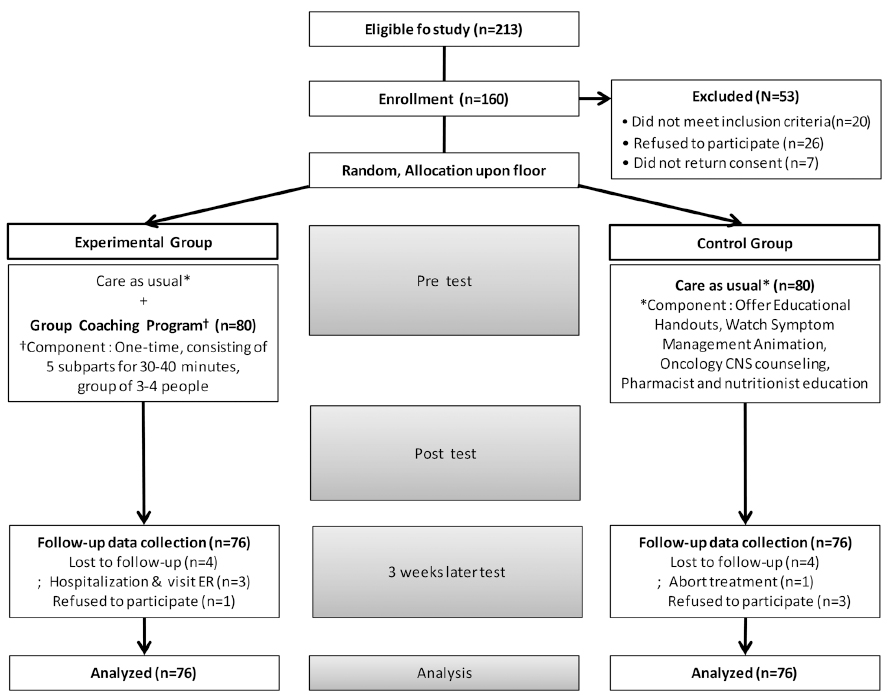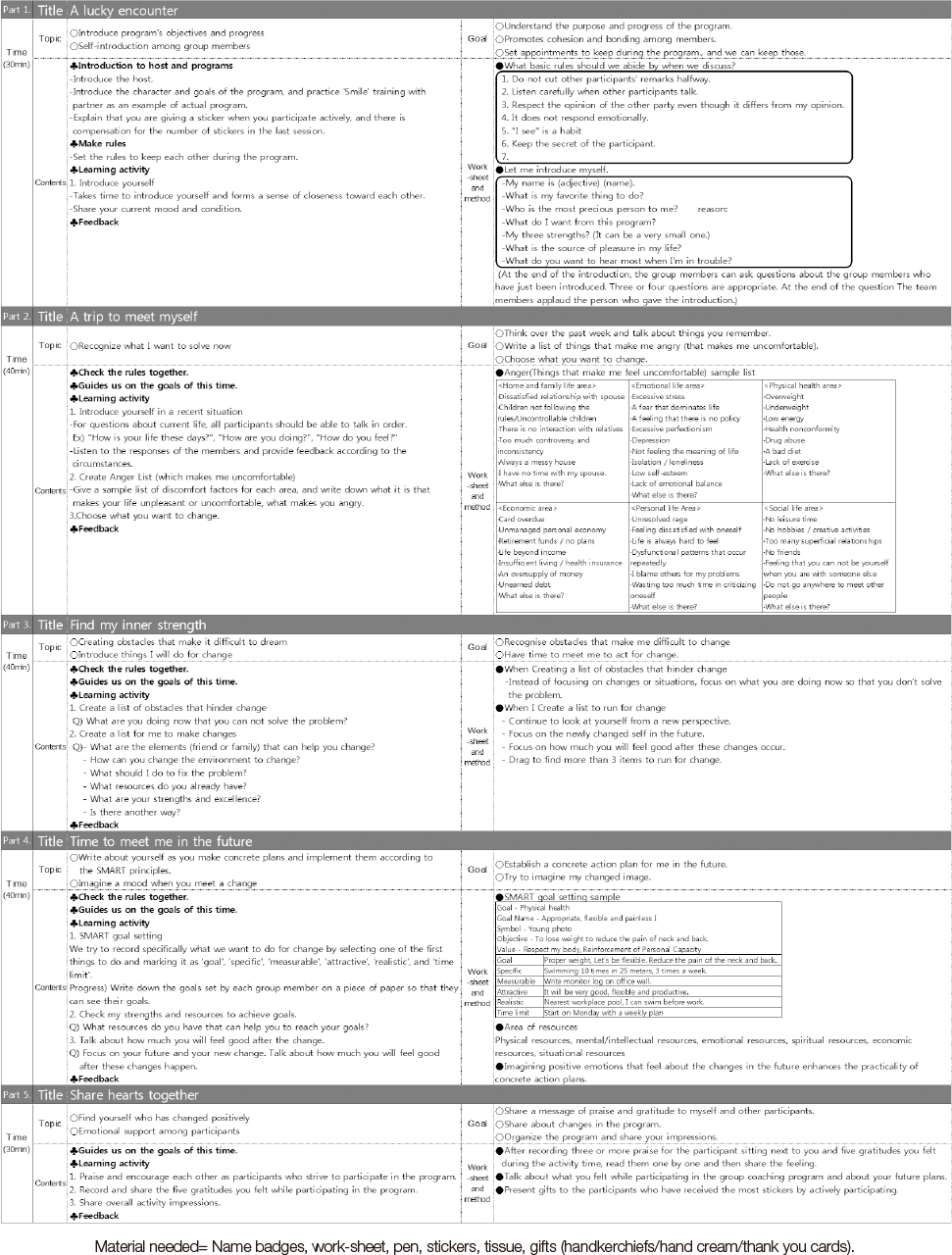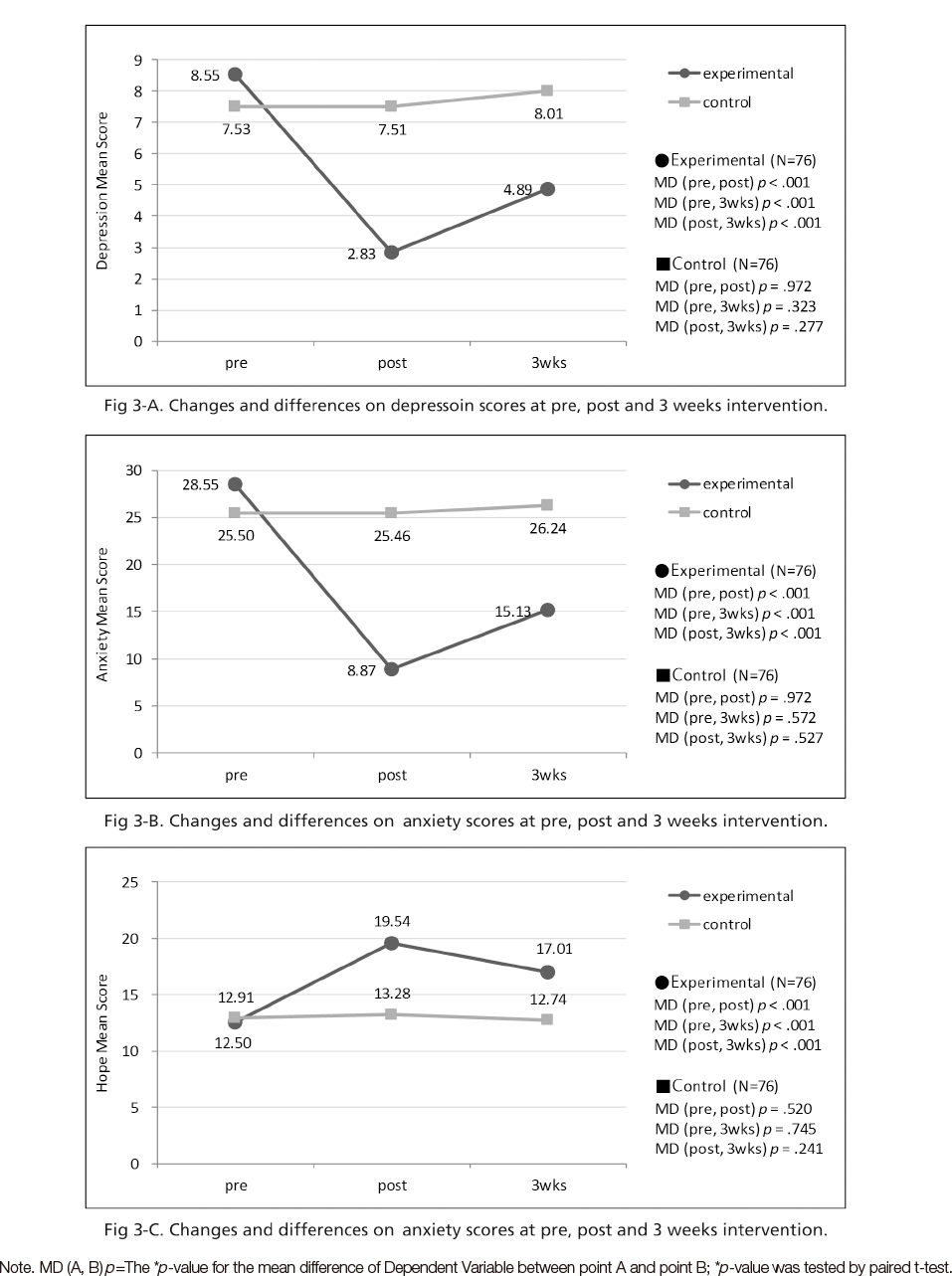Asian Oncol Nurs.
2017 Sep;17(3):188-199. 10.5388/aon.2017.17.3.188.
Effects of a Group Coaching Program on Depression, Anxiety and Hope in Women with Breast Cancer Undergoing Chemotherapy
- Affiliations
-
- 1Department of Nursing, Asan Medical Center, Seoul, Korea. chacha813@hanmail.net
- KMID: 2392518
- DOI: http://doi.org/10.5388/aon.2017.17.3.188
Abstract
- PURPOSE
The purpose of this study was to examine the effect of a group coaching program (GCP) on depression, anxiety, and hope in women breast cancer patients undergoing chemotherapy.
METHODS
A total of 152 patients were enrolled and randomly assigned to an experimental group receiving the GCP (N=76) and an untreated control group (N=76). Data collection consisted of three measurements of depression, anxiety, and hope (pre, post, and 3weeks later). The intervention was a one-time GCP consisting of 5 subparts for 30~40 minutes for a group of 3~4 people, conducted by a single nurse.
RESULTS
The scores of depression, anxiety, and hope changed significantly over time (p<.001, p<.001, p<.001). Depression, anxiety, and hope changes were significantly different between the experimental and control groups (p<.001, p<.001, p<.001). There was a difference in depression, anxiety, and hope among the groups according to the implementation of the GCP (p<.001, p<.001, p<.001). In the experimental group, depression, anxiety, and hope level were significantly different between the pre- and post-test (p<.001), pre- and 3weeks later-test (p<.001), but not in the control group.
CONCLUSION
The GCP for women breast cancer patients receiving chemotherapy was effective in reducing depression and anxiety, and increasing hope.
Keyword
Figure
Reference
-
1. World Health Organization. All cancers (excluding non-melanoma skin cancer) estimated incidence, mortality and prevalence worldwide in 2012. [Internet]. Accessed June 30, 2017. Available from: http://globocan.iarc.fr/Pages/fact_sheets_cancer.aspx.2. Korean Breast Cancer Society. Breast cancer facts & figures 2014. Seoul: Breast Cancer Society;2014.3. Lee A, Moon BI. Chemotherapy in breast cancer. Ewha Med J. 2014; 37:75–82.
Article4. Kim GD, Kim KH. Symptom cluster and quality of life in patients with breast cancer undergoing chemotherapy. Korean J Adult Nurs. 2011; 23:434–445.5. Park JH, Jun EY, Kang MY, Joung YS, Kim GS. Symptom experience and quality of life in breast cancer survivors. J Korean Acad Nurs. 2009; 39:613–621.
Article6. Ha EH, Lee SH, Jeong J, Lee HD, Lee JE, Nam SJ, et al. Biopsychosocial predictors of the quality of life in breast cancer patients. J Breast Cancer. 2010; 13:219–226.
Article7. Shin AM, Park JS. The effects of hope intervention on hope and depression of cancer patients staying at home. J Korean Acad Nurs. 2007; 37:994–1002.
Article8. Yang JH, Kim OS. The structural equation model on resilience of breast cancer patients receiving chemotherapy. J Korean Acad Nurs. 2016; 46:327–337.
Article9. Peterson DB, Hicks MD. Leader as coach: strategies for coaching and developing others. Minneapolis, MN: Personal Decisions International;1996.10. Hwang JY. Effects of group coaching program on self-esteem, subjective-wellbeing, depression for middle-aged housewives [dissertation]. Seoul: Kwangwoon Univ.;2012.11. Kim S, Kim HS, Cheong HY. Effects of a coaching-based childbirth program on anxiety and childbirth self-efficacy among primigravida women. Korean J Women Health Nurs. 2011; 17:369–377.
Article12. Burhouse A, Rowland M, Marie Niman H, Abraham D, Collins E, Matthews H, et al. Coaching for recovery: a quality improvement project in mental healthcare. BMJ Qual Improv Rep. 2015; 4:u206576.w2641.
Article13. Ko JM, Lee JK. Effects of a coaching program on comprehensive lifestyle modification for women with gestational diabetes mellitus. J Korean Acad Nurs. 2014; 44:672–681.
Article14. O'Neil A, Hawkes AL, Atherton JJ, Patrao TA, Sanderson K, Wolfe R, et al. Telephone-delivered health coaching improves anxiety outcomes after myocardial infarction: the ‘ProActive Heart’trial. Eur J Prev Cardiol. 2014; 21:30–38.15. Naik AD, White CD, Robertson SM, Armento ME, Lawrence B, Stelljes LA, et al. Behavioral health coaching for rural-living older adults with diabetes and depression: an open pilot of the HOPE Study. BMC Geriatr. 2012; 12:37.
Article16. Kim YH. The effects of psychological nursing intervention program on psychological distress and quality of life in women with breast cancer undergoing chemotherapy [dissertation]. Seoul: Chung-Ang Univ.;2013.17. Britton JJ. Effective group coaching: tried and tested tools and resources for optimum group coaching results. Mississauga: John Wiley & Sons;2010.18. Park JY. A study for developing an effective group coaching process. J Korean Coaching Res. 2010; 3:41–64.19. Go YG, Kim KI, Kim JY. Optimizing strategies for adolescent health behavior using message framing and mental fitness techniques. Seoul: Korea Institute for Health and Social Affairs;2009.20. Rehse B, Pukrop R. Effects of psychosocial interventions on quality of life in adult cancer patients: meta analysis of 37 published controlled outcome studies. Patient Educ Couns. 2003; 50:179–186.
Article21. Lee SD. The number of patients who visited our hospital last year was about 305 million. Asan Med Cent Newsmag. 2017; 550:2.22. Sellick SM, Crooks DL. Depression and cancer: an appraisal of the literature for prevalence, detection, and practice guideline development for psychological interventions. Psychooncology. 1999; 8:315–333.
Article23. McNair DM, Lorr M, Droppleman LF. Profile of moods states. San Diego, CA: Educational and Industrial Testing Service;1971.24. Yeun EJ, Shin-Park KK. Verification of the profile of mood statesbrief: cross-cultural analysis. J Clin Psychol. 2006; 62:1173–1180.
Article25. Spielberger CD. Anxiety: state-trate-process. In : Spielberger CD, Saranson IG, editors. Stress and anxiety. New York, NY: John Wiley & Sons;1975. p. 115–143.26. Kim JT, Shin DG. A study based on the standardization of the STAI for Korea. New Med J. 1978; 21:69–75.27. Snyder CR, Sympson SC, Ybasco FC, Borders TF, Babyak MA, Higgins RL. Development and validation of the state hope scale. J Pers Soc Psychol. 1996; 70:321–335.
Article28. Kim TH. The effects of hope and meaning of life on adolescent's resilience [dissertation]. Seoul: Hanyang Univ.;2004.29. Wilkie D, Berry D, Cain K, Huang HY, Mekwa J, Lewis F, et al. Effects of coaching patients with lung cancer to report cancer pain. West J Nurs Res. 2010; 32:23–46.
Article30. Tae YS, Youn SJ. Effects of a forgiveness nursing intervention program on hope and quality of life in woman cancer patients. Asian Oncol Nurs. 2006; 6:111–120.
- Full Text Links
- Actions
-
Cited
- CITED
-
- Close
- Share
- Similar articles
-
- The Effects of Spirituality/Hope Promoting Programs on Fighting Spirit, Helplessness, Anxiety, and Self-care in People with Cancer
- Effects of a Coaching-based Childbirth Program on Anxiety and Childbirth Self-efficacy among Primigravida Women
- Development and Effectiveness of Expressive Writing Program for Women with Breast Cancer in Korea
- Effects of Meditation Program on Power, Anxiety, Depression and Quality of Life in Women with Breast Cancer
- Influencing Factors on Hope Among Patients with Breast Cancer




